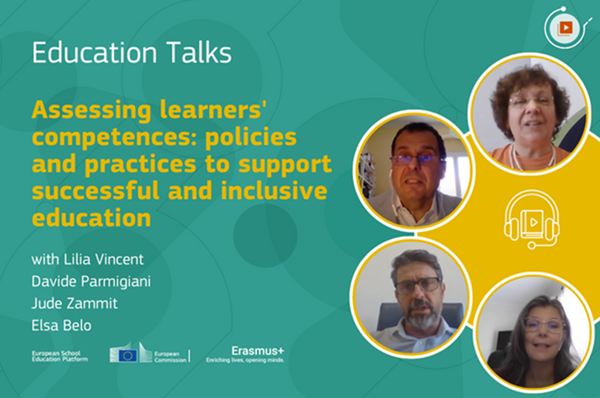Education Talks: Assessing learners' competences

Assessing learners’ competences: policies and practices to support successful and inclusive education
European Union countries are introducing a new competence-based curriculum. The key role of assessment practices to support competence acquisition was acknowledged by the 2022 Council Recommendation on Pathways to School Success. The emphasis of competence-based teaching and learning is on the application of knowledge in real-life situations. So, this way, it represents a significant departure from content-only based education and therefore requires new approaches to assessment.
It was agreed and assumed that multiple types of assessment and new assessments methods are all essential over time in order to get the full picture of learners’ performance and progress as they capture a broader range of learning gains that are needed. These assessment practices intend to ensure that all learners can develop their full potential, irrespective of personal circumstances and socioeconomic background.
Bearing these assumptions in mind, during the first semester 2023, the European Education Area "Working Group on Schools" explored the question “How can an effective alignment of formative and summative assessments of learners' key competencies be ensured and supported and be more effectively integrated in teaching and learning?” The key messages drawn from this work have been published in the thematic report.
Key message 1 - Ensuring a balanced and coherent approach to assessment of learner competences
Balancing summative and formative assessment is the way to include everybody. All students can be included effectively into the classroom through several assessment methods. Summative assessment methods are useful for assessing contents. In particular, summative assessment can tell the students, "You have arrived up to this point". Or maybe, "You remember these notions", but summative assessment cannot say, "You are skilled in this field".
Instead, formative assessment is crucial for helping the students in reflecting on their own learning strategies. So, formative assessment can tell the students “How can you improve your learning styles?” Or rather, "In what ways you might face these situations?" In the end, summative and formative assessment can easily connect contents given by the theory and the practical situations given by the real world. Policymakers should sustain the creation of programmes to educate both in-service and pre-service teachers in using several assessment methods, mixing summative and formative ones in order to create open and critical environments.
Key message 2 - Ensuring that learner assessment approaches are “fit for purpose”
With regards to assessment for learning, we have established a team within the Education Assessment Unit to support educators and school leaders by offering direction and guidance to enrich teaching and learning experiences through formative assessment practices, aiming to sustain an ongoing dialog with school communities to embrace such opportunities.
Curriculum support is a key feature of the support given by the team, and this is done through a learning team approach providing support to educators during curriculum time and subject meetings. Apart from the formative element, the Education Assessment Unit is also responsible for summative assessments and therefore is entrusted with the provision of annual examination papers. Quality is ensured by subject experts. The team strives to constantly provide training and resources that are valid, reliable and fit for purpose.
Key message 3 - Developing a long-term strategy to integrate new approaches to assessment across systems
I'm going to highlight a long-term strategy to integrate new approaches of assessment across systems. To address these, make sure that these long-term plans have a clear vision, a way of executing the changes, and it's very important to foresee a way to measure the results and effects. Use a strategic approach. Do it gradually, experimenting and improving in some schools before making changes across the entire system.
For example, in Portugal, after a pilot programme, a reform was gradually introduced with a competence-based curriculum, giving schools autonomy and curricular flexibility and with a focus on inclusive education. Finally, it is vital to ensure that teacher training is included in the strategic approach.
In Portugal, a national capacity-building programme on pedagogical assessment was implemented in the last three years in collaboration with teacher training centres. It provided updating and clarification of concepts and it showed the importance of giving teachers the freedom to use different methods and making sure they have access to relevant learning opportunities, as well as guidelines, tools and examples of good practice, including practical ways to combine assessment methods in the classroom. Involving teachers and school leaders in changing processes and supporting them are the key to a long-term change.
Further reading
Additional information
-
Education type:School Education
-
Target audience:TeacherStudent TeacherHead Teacher / PrincipalTeacher EducatorGovernment / policy maker
-
Target audience ISCED:Primary education (ISCED 1)Lower secondary education (ISCED 2)Upper secondary education (ISCED 3)
